241 start with B start with B
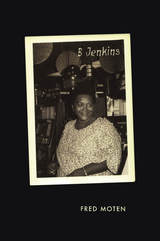
The first and last poems in the collection are explicitly devoted to Moten’s mother; the others relate more obliquely to her life and legacy. They invoke performers, writers, artists, and thinkers including not only James Baldwin, Roland Barthes, Frederick Douglass, Billie Holiday, Audre Lorde, Charlie Parker, and Cecil Taylor, but also contemporary scholars of race, affect, and queer theory. The book concludes with an interview conducted by Charles Henry Rowell, the editor of the journal Callaloo. Rowell elicits Moten’s thoughts on the relation of his poetry to theory, music, and African American vernacular culture.

In this hybrid of lyric poetry and essay, Consuelo Wise utilizes repetition, fragmentation, and syntax to construct a form that repeatedly falls apart. Breaks in lines and fragmented stanzas are followed by accumulative rushes, slashes, brackets, and words pushed together.
Throughout this book-length poem, Wise composes a meditation and an investigation into loss and identity. Moving between sound and image, aggression and subtlety, b o y pries open memories that resist understanding but also refuse to be forgotten. Wise peels back layers of mourning, considering how it can be experienced as a personal, inherited, environmental, social, and historical phenomenon. Throughout, the protagonist in b o y reenvisions ways to process a great loss, listening closely and searching for words while “the earth is shaking and the silence is pressing down.”

W. S. Gilbert, renowned author of the Savoy Operas, was also the creator of the Bab Ballads--"possibly the best comic verse--and surely the best illustrated--in the English language," according to James Ellis. Gilbert published these poems, together with his own, grotesque drawings signed "Bab," a childhood nickname, in Fun and other magazines in the late nineteenth century.
In 1898, the older and by then distinguished Gilbert substituted pallid and inoffensive drawings for the originals, which he had come to believe "erred gravely in the direction of unnecessary extravagance." Since then the ballads have been collected and published in various editions, most of which have featured the revised drawings and only a selection of the poems.
This is the only book to offer the complete collection of ballads with all original illustrations, a tribute to the comic genius of a writer known as "the most original dramatist of his generation." This collection will delight readers with its irreverence and wit.
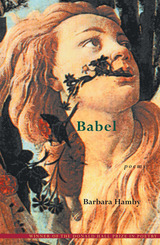
In poems such as “Six, Sex, Say,” she displays a linguistic bravado that moves effortlessly through translations, cognates, and homonyms. This love of words permeates the poems, from the husband wooing his future wife “with a barrage of words so cunningly fluent, / so linguistically adroit” in “Flesh, Bone, and Red,” to the alphabetic sampler woven from memory and love in “Ode on My Mother's Handwriting.”
Hamby's poems drift across histories and continents, from early writing and culture in Mesopotamia through the motion-picture heaven that seems so much like Paris, to odes on such thoroughly American subjects as hardware stores, bubblegum, barbecue, and sharp-tongued cocktail waitresses giving mandatory pre-date quizzes to lawyers and “orangutans in the guise of men.” As Booklist noted in reviewing her previous collection, Hamby's poems “are tsunamis carrying you far out to sea and then back to shore giddy and glad to be alive.”

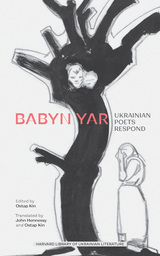

Three plays by ancient Greece’s third great tragedian.
One of antiquity's greatest poets, Euripides has been prized in every age for the pathos, terror, and intellectual probing of his dramatic creations. The new Loeb Classical Library edition of his plays is in six volumes.
In Bacchae, one of the great masterpieces of the tragic genre, Euripides tells the story of king Pentheus' resistance to the worship of Dionysus and his horrific punishment by the god: dismemberment at the hands of Theban women. Iphigenia at Aulis, also in Volume VI, recounts the sacrifice of Agamemnon's daughter to Artemis, the price exacted by the goddess for favorable sailing winds. Rhesus dramatizes a pivotal incident in the Trojan War. This play is probably not by Euripides; but it does give a sample of what tragedy was like after the great fifth-century playwrights.
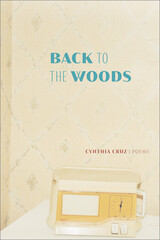
National Book Critics Circle Award Winner Cynthia Cruz reevaluates the paradox of the death drive in her eighth collection of poetry, Back to the Woods. Could it be that in ceaselessly snuffing ourselves out we are, in fact, trying to survive? In “Shine,” Cruz’s speaker attests that “if [she] had a home, it would be // a still in a film / where the sound / got jammed.” This book inhabits the silence of the empty orchestra pit, facing “dread, and its many / instruments of sorrow.” The quiet asks, “Did you love this world / and did this world / not love you?” We return to the site of our suffering, we perform the symphony of all our old injuries, to master what has broken us. To make possible the future, we retreat into the past. “I don’t know / the ending. // I don’t know anything,” our speaker insists, but she follows the wind’s off-kilter song of “winter / in the pines” and “the dissonance / of siskins.” Cruz heeds the urgency of our wandering, the mandate that we must get back to the woods, not simply for the forest to devour us — she recognizes in the oblivion “flooding out / from its spiral branches” an impossible promise. At the tree line, we might vanish to begin again.
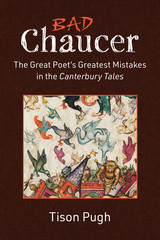

In Bad Mexican, Bad American, the minimalist, working-class aesthetic of a “disadvantaged Brown kid” takes wing in prose poems that recall and celebrate that form’s ties to Surrealism. With influences like Alberto Ríos and Ray Gonzalez on one hand, and James Tate and Charles Baudelaire on the other, the collection spectacularly combines “high” art and folk art in a way that collapses those distinctions, as in the poem “My Date with Frida Kahlo”: “Frida and I had Cuban coffee and then vegetarian tacos. We sipped on mescal and black tea. At the end of the night, following an awkward silence during a conversation on Cubism, we kissed for about thirty minutes beneath a protest mural by David Alfaro Siqueiros.”
Bad Mexican, Bad American demonstrates how having roots in more than one culture can be both unsettling and rich: van Gogh and Beethoven share the page with tattoos, graffiti, and rancheras; Quetzalcoatl shows up at Panda Express; a Mexican American child who has never had a Mexican American teacher may become that teacher; a parent’s “broken” English is beautiful and masterful. Blending reality with dream and humility with hope, Hernandez Diaz contributes a singing strand to the complex cultural weave that is twenty-first-century poetry.
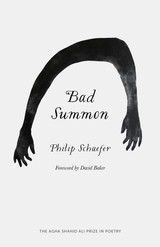
Winner of the Agha Shahid Ali Poetry Prize
Bad Summon explores the relationship between the majesty of nature and the quiet violence humans inflict upon themselves and others. The poems are dipped in loss, traveling between death and mountains, romance and rivers. They are addicted to the truth of experience and the energy behind regret. Bad Summon conjures its own ghost. According to David Baker, the judge who selected the winning manuscript, this is a “surprising, coherent, original collection of lyric poems. I felt peril, heartbreak, catastrophe, sorrow, genuine soulfulness. It’s also funny, yet its humor is not comic but possesses a terrible gravity.” This is a volume every poetry lover will want to explore.
[In this one we aren’t exactly drowning]
but we are falling through water.
Quieter than we expect. Churning
is how we’ll later describe it.
Our arms dig out two wet Cs,
a heart if you want to look at it
that way. Though the body is always
in between—that unoriginal arrow.
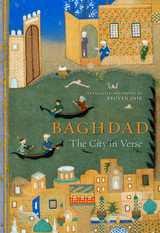
Baghdad: The City in Verse captures the essence of life lived in one of the world’s great enduring metropolises. In this unusual anthology, Reuven Snir offers original translations of more than 170 Arabic poems—most of them appearing for the first time in English—which represent a cross-section of genres and styles from the time of Baghdad’s founding in the eighth century to the present day. The diversity of the fabled city is reflected in the Bedouin, Muslim, Christian, Kurdish, and Jewish poets featured here, including writers of great renown and others whose work has survived but whose names are lost to history.
Through the prism of these poems, readers glimpse many different Baghdads: the city built on ancient Sumerian ruins, the epicenter of Arab culture and Islam’s Golden Age under the enlightened rule of Harun al-Rashid, the bombed-out capital of Saddam Hussein’s fallen regime, the American occupation, and life in a new but unstable Iraq. With poets as our guides, we visit bazaars, gardens, wine parties, love scenes (worldly and mystical), brothels, prisons, and palaces. Startling contrasts emerge as the day-to-day cacophony of urban life is juxtaposed with eternal cycles of the Tigris, and hellish winds, mosquitoes, rain, floods, snow, and earthquakes are accompanied by somber reflections on invasions and other catastrophes.
Documenting the city’s 1,250-year history, Baghdad: The City in Verse shows why poetry has been aptly called the public register of the Arabs.


The Emily Dickinson manuscripts are a cherished part of Houghton Library’s collections and—while it is her poems and letters that are most often celebrated—the poet’s lesser known lines: “2 Butter. / 19 eggs. / 5 pounds Raisins” are also cause to celebrate.
Dickinson’s manuscript recipe for black cake, from which these lines come, was sent along with a bouquet of flowers to Nellie Sweetser in the summer of 1883. Black cake is a traditional Christmas specialty closely related to the English fruitcake, “blackened” with the addition of burnt sugar syrup or molasses. It was generously spiced with nutmeg, cinnamon, mace, and clove before being wrapped in brandy- or rum-soaked cloth and often aged at least a month. The recipe, though somewhat shocking to a modern reader (19 eggs!), turns out to be remarkably orthodox in its ratios, if not its scale. Fully assembled, the recipe produces batter weighing in excess of twenty pounds.
Delve into the history of this majestic cake and explore the story of each ingredient, in the context of Emily Dickinson’s nineteenth-century Amherst home, with librarians of Houghton. Each ingredient is accompanied with watercolors by Robin Harney evoking Dickinson’s moment in time and moments in the kitchen.
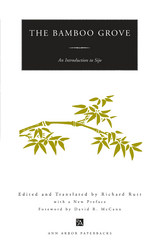
The popularity of the sijo in Korea--writers range from royalty to common citizens--is always a challenge for the translator, who must often inhabit widely differing backgrounds to completely understand a poem's subtle nuances. Richard Rutt's translations, considered to be some of the best available in English, remain true to the unique structure of the original Korean lyric.
The Bamboo Grove will interest not only poets and students of poetry, but scholars of Korean culture curious to view history through this important and significant form of verse.
The white snow has left the valleys where the clouds are lowering,
Is it true that somewhere the plum trees have happily blossomed?
I stand here alone in the dusk and do not know where to go.
YI SAEK (1328-1396)
Richard Rutt is also the editor and translator of the book Virtuous Women: Three Classic Korean Novels and, most recently, The Zhou Yi: A New Translation with Commentary of the Book of Changes. David R. McCann is Korea Foundation Professor of Korean Literature and Professor of East Asian Languages and Civilizations, Harvard University.
![front cover of banana [ ]](https://www.bibliovault.org/thumbs/978-0-8229-6693-7-thumb.jpg)
Winner, Donald Hall Prize for Poetry
Finalist, 2023 NBCC Award for Poetry
Winner, 2023 Poetry Society of America Norma Farber First Book Award
Finalist, 2023 Washington State Book Award in Poetry
Finalist, 2024 Kate Tufts Discovery Award
The poems in Paul Hlava Ceballos’s debut collection banana [ ] reveal the extractive relationship the United States has with the Americas and its people through poetic portraits of migrants, family, and personal memories. At the heart of the book is a long poem that traces the history of bananas in Latin America using only found text from sources such as history books, declassified CIA documents, and commercials. The book includes collage, Ecuadorian decimas, a sonnet series in the voices of Incan royalty at the moment of colonization, and a long poem interspersed with photos and the author’s mother’s bilingual idioms. Traversing language and borders, history and story, traditional and invented forms, this book guides us beyond survival to love.
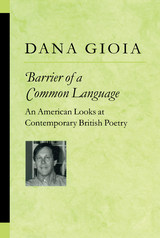
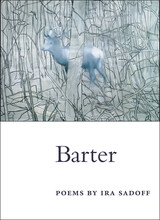
Rooted firmly in the “fleeting world,” Sadoff’s poems find epiphanies of meaning in unexpected and even unpleasant experiences and emotions. The poems in Barter delve deeply into the past, the personal past of regret, travel, love, divorce, and bereavement, as well as the global past of Beethoven, Vietnam, and the fall of communism. Each poem is offered up by Sadoff as a barter, something to be traded for a little more time, a little more understanding.
The poems in Barter comment on the power of culture to interject itself into our desire for an idealized self, the way our inner and outer lives lack correspondence, harmony, and integration. They also talk about commerce, the trading of bodies, the way we as a nation “use” and exchange and appropriate -- and like Tolstoy’s Ivan Ilyich, try to bargain with and evade the urgency of our time on earth.
In the poem “Self-Portrait with a Critic,” Sadoff makes what could be a succinct statement of purpose: “And inside, let’s not make it pretty, / let’s save the off-rhyme and onomatopoeia / / for the concert hall, let’s go to the wormy place / where the problematic stirs inside his head.”
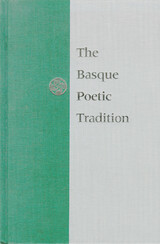

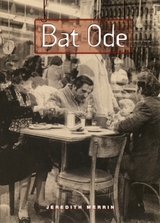

The Battle of Kosovo cycle of heroic ballads is generally considered the finest work of Serbian folk poetry. Commemorating the Serbian Empire’s defeat at the hands of the Turks in the late fourteenth century, these poems and fragments have been known for centuries in Eastern Europe. With the appearance of the collections of Serbian folk poems by Vuk Stefanovic Karasdzic, the brilliance of the poetry in the Kosovo and related cycles of ballads was affirmed by poets and critics as deeply influential as Goethe, Jacob Brimm, Adam Mickiewicz, and Alexander Pushkin. Although translations into English have been attempted before, few of them, as Charles Simic notes in his preface, have been persuasive until now. Simic compares the movement of the verse in these translations to the “variable foot” effect of William Carlos Williams’s later poetry, and argues that John Matthias “grasps the poetic strategies of the anonymous Serbian poet as well as Pound did those of Chinese poetry.”
First published in 1987, the translation of the Battle of Kosovo is now reprinted both because of its intrinsic merits and because the recent crisis in Kosovo itself compels the entire world to understand the nature of the ancient conflicts and passions that fuel it. Although Matthias and Simic have elected to retain their original preface and introduction, Christopher Merrill, a scholar of the region and author of Only the Nails Remain, has contributed a brief afterword explaining the importance of this poetry in the context of NATO’s first military action ever against a sovereign nation.

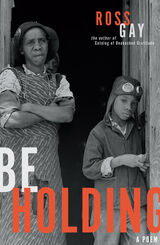
Winner, 2021 Ohioana Book Award in Poetry
Be Holding is a love song to legendary basketball player Julius Erving—known as Dr. J—who dominated courts in the 1970s and ‘80s as a small forward for the Philadelphia ‘76ers. But this book-length poem is more than just an ode to a magnificent athlete. Through a kind of lyric research, or lyric meditation, Ross Gay connects Dr. J’s famously impossible move from the 1980 NBA Finals against the Los Angeles Lakers to pick-up basketball and the flying Igbo and the Middle Passage, to photography and surveillance and state violence, to music and personal histories of flight and familial love. Be Holding wonders how the imagination, or how our looking, might make us, or bring us, closer to each other. How our looking might make us reach for each other. And might make us be reaching for each other. And how that reaching might be something like joy.

Beachlight is a sustained poem divided into smaller parts that take on the anonymous voices of those lost and forgotten. A walk along a Singaporean beach transforms into a meditation that bridges an ecological consciousness to the sexual and the homoerotic. The poems in Beachlight expose revelations about the nature of desire, inviting readers to walk beside—and inside—them, reminding us of what we gain when we abandon ourselves to nature and exhorting us to reclaim our primordial connections to the world and to one another.
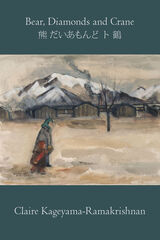
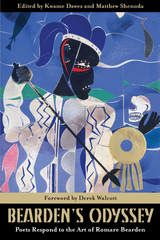
Borrowing from Romare Bearden’s aesthetic palette and inspired by his Odysseus series, Bearden’s Odyssey gathers, for the first time, poems from thirty-five of the most revered African diaspora poets in the United States. Poetic echoes come forth in themes of inspiration with historical intersections of one of the greatest visual artists of the twentieth century.
The award-winning editors, Kwame Dawes and Matthew Shenoda, assemble an esteemed literary congregation, with original poems by Chris Abani, Rita Dove, Lyrae Van Clief-Stefanon, Ed Roberson, Aracelis Girmay, Yusef Komunyakaa, and more. With a powerful foreword by Nobel laureate Derek Walcott and stunning visual reproductions of select Bearden masterpieces, this anthology fuses art and literature, standing as a testament to Romare Bearden’s power and influence in the contemporary artistic world.
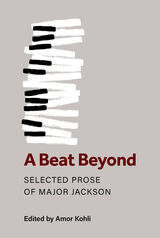
In this collection of essays, talks, and reviews, Major Jackson revels in the work of poetry not only to limn and assess the intellectual and spiritual dimensions of poets, but to amplify the controversies and inner conflicts that define our age: political unrest, climate crises, the fallout from bewildering traumas, and the social function of the art of poetry itself. Accessible and critically minded, Jackson returns to the poem as an unparalleled source of linguistic pleasure that structures a multilayered “lyric self.” In his interviews, Jackson illustrates poetry’s distinct ability to mediate the inexplicable while foregrounding the possibilities of human song.
Collected over several decades, these essays find Jackson praising mythmaking in Frank Bidart and Ai’s poetry, expressing bafflement at the silence of white-identified poets in the cause of social and racial justice, unearthing the politics behind Gwendolyn Brooks’s Pulitzer Prize, and marveling at the “hallucinatory speed of thought” in a diverse range of poets including Mei-mei Berssenbrugge, Brenda Hillman, Afaa Michael Weaver, Forrest Gander, and Terrance Hayes. This collection passionately surveys the radical shifts of the art and notes poetry as a necessity for a modern sensibility.
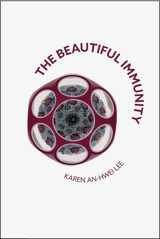
The Beautiful Immunity asks how we create good in an imperfect world of fallible souls. Spare and formally daring, these poems were refined through the catastrophes of wildfires, recession, and a major public health crisis through the hope of a beautiful immunity—an everlasting salve for the lost. This slender volume reads as the culmination of more than a decade’s worth of labor, documenting large-scale social, cultural, and political upheavals, as well as the moment when the word “anthropause” floated indelibly into the world’s vocabulary.
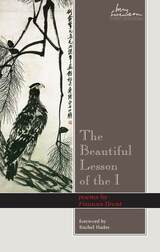
The Beautiful Lesson of the I is a collection of finely made poems by an accomplished poet. It will reward the scholar and the student of poetry, as well as the reader looking for the simple pleasures of poetic insight authentically felt. Winner of the Swenson Poetry Award 2005. Now in paperback.
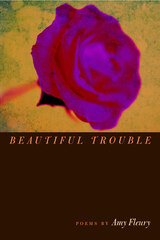
In her first collection of poems, Kansas native Amy Fleury captures images of dragging clotheslines, baked lawns, and sweet potato babies, inserting them with an earnest dignity into her stories of midwestern life. Beautiful Trouble explores the subtleties of landscape, place, families, girlhood, womanhood, and everyday existence on the prairie. Fleury writes of the Midwest with authenticity, speaks of romance with delicate allure, and recalls the heartbreak of childhood without self-pity. In meditations on resilience and life’s contradictions, Fleury engages her characters fully and paints their souls and sensations evenly in language both rare and beautiful. She is a poet in love with sound and its power to summon majesty from quotidian scenes. Her poems are brief and striking, depending on exquisite word choice and balance to achieve a simple order on the page.
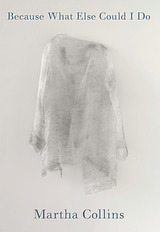
Because What Else Could I Do is a sequence of fifty-five untitled short poems, almost all of them addressed to the poet’s husband during the six months following his sudden and shocking death. Perhaps best known for her historical explorations of sociopolitical issues, Martha Collins did not originally intend to publish these poems. But while they are intensely personal, they make use of all of her poetic attention and skills. Spare, fragmented, musical even in their most heartbreaking moments, the poems allow the reader to share both an intimate expression the poet’s grief and a moving record of her attempt to comprehend the events surrounding her loss.

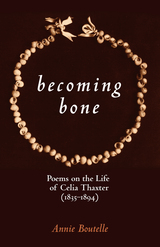
In the tradition of such outstanding biography-in-poetry collections as Maurice Manning’s A Companion of Owls about Daniel Boone and Sharon Chmielarz’s The Other Mozart, Annie Boutelle’s first collection probes the layered life of one of nineteenth-century America’s most popular poets, who is now almost forgotten. The Celia Thaxter who speaks these poems disturbs the placid myth created around her public persona, and focuses on the fierce mysteries and ironies that frame her. Boutelle carefully reveals Thaxter’s childhood on the stark Isles of Shoals off the New Hampshire coast; the trap of a Victorian marriage; the struggle to invent herself as a writer and painter; her celebrated circle of friends, which included Nathaniel Hawthorne, John Greenleaf Whittier, Sarah Orne Jewett, and Childe Hassam; and the hard-won serenity of her last decade. At the fringes of Thaxter’s life a wider world clamors, particularly with the onset of the Civil War. At the center rests a quiet, almost elliptical silence.
Like fine champagne, these poems ravish. Clear, airy, crystalline, they move us into an elemental world where “nothing is left but water, / air, and the uncertain space between.” The spare language resonates. With restraint and lyric tenderness, Boutelle leads us toward a woman who shifts from pose to necessary pose, who survives in these pages with intelligence and grace: “The grave / flesh melts. What’s left / is light as bone.”
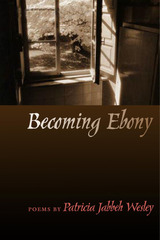
Recapturing the celebratory voice of Africa in poems that are both contemporary and traditional, Liberian-born Patricia Jabbeh Wesley weaves lyrical storytelling with oral history and images of Africa and America, revealing powerful insights about the relationship between strength and tragedy—and finding reason to celebrate even in the presence of war, difficulties, and death. Rooted in myths that can be traced to the Grebo tradition, Becoming Ebony portrays Liberian-born Wesley’s experiences of village talk and civil war as well as her experiences of the pain of her mother’s death and the difficulties of rearing a family away from home in the United States, and explores the questions of living in the African Diaspora. Turning on the African proverb of “the wandering child” and the metaphor of the ebony tree—which is beautiful in life and death— these poems delve into issues of human suffering and survival, plainly and beautifully chronicling what happens “after the sap is gone.”
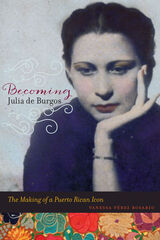
In the first book-length study written in English, Vanessa Pérez-Rosario examines poet and political activist Julia de Burgos's development as a writer, her experience of migration, and her legacy in New York City, the poet's home after 1940. Pérez-Rosario situates Julia de Burgos as part of a transitional generation that helps to bridge the historical divide between Puerto Rican nationalist writers of the 1930s and the Nuyorican writers of the 1970s. Becoming Julia de Burgos departs from the prevailing emphasis on the poet and intellectual as a nationalist writer to focus on her contributions to New York Latino/a literary and visual culture. It moves beyond the standard tragedy-centered narratives of de Burgos's life to place her within a nuanced historical understanding of Puerto Rico's peoples and culture to consider more carefully the complex history of the island and the diaspora. Pérez-Rosario unravels the cultural and political dynamics at work when contemporary Latina/o writers and artists in New York revise, reinvent, and riff off of Julia de Burgos as they imagine new possibilities for themselves and their communities.

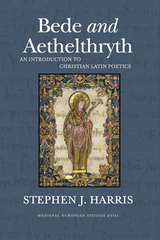
Bede and Aethelthryth asks why Christians in Britain around the year 700 enjoyed Latin poetry. What did they see in it? What did they get from it? This book attempts to reconstruct the horizon of expectation of a highly learned, Latin-speaking nun as she encounters a fifty-line poem by the Venerable Bede, the Hymn to Aethelthryth.
The reconstruction is hypothetical and derived from grammatical manuals, learned commentaries from the early medieval period (especially Servius’s commentary on Virgil), and a wide variety of aesthetic observations by classical and medieval readers. The first four chapters describe basic expectations of a reader of Christian Latin poetry. The fifth chapter places the Hymn in its context within Bede’s Ecclesiastical History. A few pages after Bede records his hymn, Caedmon will recite his own hymn under the watchful eye of Whitby’s Abbess Hild, who was a friend of Aethelthryth.
Both hymns are attempts to reform the lyric traditions of pagan Rome and pagan Anglo-Saxon England in the light of Christian teaching. The last three chapters contain a line-by-line commentary on Bede’s alphabetic, epanaleptic elegy.
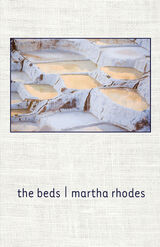
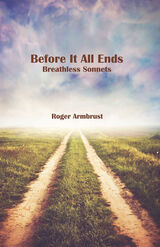
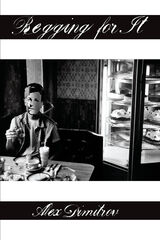
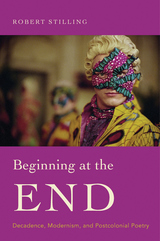
During the struggle for decolonization, Frantz Fanon argued that artists who mimicked European aestheticism were “beginning at the end,” skipping the inventive phase of youth for a decadence thought more typical of Europe’s declining empires. Robert Stilling takes up Fanon’s assertion to argue that decadence became a key idea in postcolonial thought, describing both the failures of revolutionary nationalism and the assertion of new cosmopolitan ideas about poetry and art.
In Stilling’s account, anglophone postcolonial artists have reshaped modernist forms associated with the idea of art for art’s sake and often condemned as decadent. By reading decadent works by J. K. Huysmans, Walter Pater, Henry James, and Oscar Wilde alongside Chinua Achebe, Derek Walcott, Agha Shahid Ali, Derek Mahon, Yinka Shonibare, Wole Soyinka, and Bernardine Evaristo, Stilling shows how postcolonial artists reimagined the politics of aestheticism in the service of anticolonial critique. He also shows how fin de siècle figures such as Wilde questioned the imperial ideologies of their own era.
Like their European counterparts, postcolonial artists have had to negotiate between the imaginative demands of art and the pressure to conform to a revolutionary politics seemingly inseparable from realism. Beginning at the End argues that both groups—European decadents and postcolonial artists—maintained commitments to artifice while fostering oppositional politics. It asks that we recognize what aestheticism has contributed to politically engaged postcolonial literature. At the same time, Stilling breaks down the boundaries around decadent literature, taking it outside of Europe and emphasizing the global reach of its imaginative transgressions.

Beginning with Plato was first published in 1944. Minnesota Archive Editions uses digital technology to make long-unavailable books once again accessible, and are published unaltered from the original University of Minnesota Press editions.
These selected poems of Joseph Warren Beach range in time from the present year to the age of Pericles; in place from California to Shangri-La, from Paris to the Middle West; in theme from current political issues to the timeless problems of Greek philosophy; in mood from tender love to trenchant satire. In these fifty-odd poems is a rich variety—Anthony Eden and Cordell Hull, the French capital in the summer preceding the first World War, the skylines of the American West, the skylines of Minneapolis, soldier and swan maiden, and the inner life of man wherever lived. Mr. Beach can tell home truths without bitterness, and handle nostalgic emotion without sentimentality.
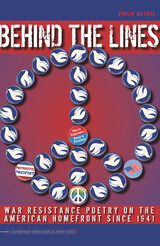
Behind the Lines investigates American war resistance poetry from the Second World War through the Iraq wars. Rather than simply chronicling the genre, Philip Metres argues that this poetry gets to the heart of who is authorized to speak about war and how it can be represented. As such, he explores a largely neglected area of scholarship: the poet’s relationship to dissenting political movements and the nation.
In his elegant study, Metres examines the ways in which war resistance is registered not only in terms of its content but also at the level of the lyric. He proposes that protest poetry constitutes a subgenre that—by virtue of its preoccupation with politics, history, and trauma—probes the limits of American lyric poetry. Thus, war resistance poetry—and the role of what Shelley calls unacknowledged legislators—is a crucial, though largely unexamined, body of writing that stands at the center of dissident political movements.
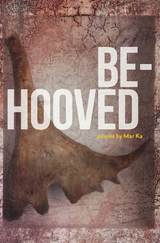
Entrancing, profound, and startling, this book is a testament to hope before change, persistence before confusion, and empathy before difference: all the world’s light and all the world’s dark / can fit into an eye into a heart.
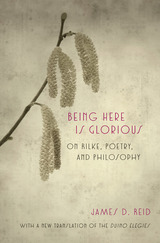
With a new translation of the Duino Elegies
“Who, if I cried out, would hear me among the angels’/orders?” Rainer Maria Rilke’s Duino Elegies opens with one of the most powerful poetic expressions of the search for meaning in the modern world. Published in 1923, the Elegies would influence important philosophers on the Continent, including Heidegger. But with a few exceptions, Rilke’s poetry has not had an impact on philosophy in the Anglo-American world. In Being Here Is Glorious, James D. Reid offers a fresh translation of the Elegies, which hews to the form of the original and provides his own meditation on the place of poetry in philosophy. Reid makes a convincing case that poetry and philosophy can address the problem of finding things significant and worth affirming in light of various reasons to doubt the value of the world in which we find ourselves cast.

Different as they were as poets, Wallace Stevens, E. E. Cummings, Robert Frost, and Williams Carlos Williams grappled with the highly charged literary politics of the 1930s in comparable ways. As other writers moved sharply to the Left, and as leftist critics promulgated a proletarian aesthetics, these modernist poets keenly felt the pressure of the times and politicized literary scene. All four poets saw their reputations critically challenged in these years and felt compelled to respond to the new politics, literary and national, in distinct ways, ranging from rejection to involvement.
Beleaguered Poets and Leftist Critics closely examines the dynamics of these responses: what these four poets wrote—in letters, essays, lectures, fiction (for Williams), and most importantly, in their poems; what they believed politically and aesthetically; how critics, particularly leftist critics, reviewed their work; how these poets reacted to that criticism and to the broader milieu of leftism. Each poet’s response and its subsequent impact on his poetic output is a unique case study of the conflicting demands of art and politics in a time of great social change.
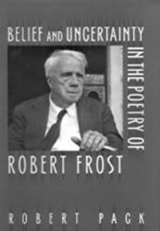
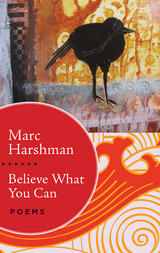
These difficulties come “not quite haphazardly” and not without a “last light”—something “beyond” and as “sweet as apples.” With these moments of grace, Harshman taps into the satisfying richness that comes from unexpected revelations, helping us rise above the fragile recesses of life and death, all while portraying the lost rural worlds of the Midwest and Appalachia in ways untouched by sentiment or nostalgia.
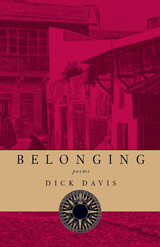
There are worlds within our own in which even the smallest victories are hard won, the tender moment is almost unbearable, and the understated rings like a bell. Belonging, a new collection by British poet Dick Davis, is an extended visit to these worlds.
Deepened by his dry wit and the formal rigor of his verse, the poems of Belonging negotiate their way among personal and political divides—generations in a family, man and woman, and the tentative present and our inherited pasts.
But behind much of the writing there is also a desire for a kind of idealized belonging—to a clerisy of civilized and humane decency which can be found intermittently in all cultures and is the monopoly of none. Davis’s own cosmopolitan background provides the context for many of the poems, yet he is concerned always to find the humanly universal within the local and anecdotal—a hope realized in these careful and incandescent poems.
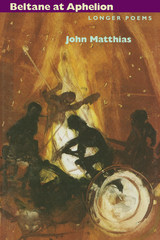
Beltane at Aphelion collects all of John Matthias’s longer poems and is published simultaneously with Swimming at Midnight, which collects his shorter poems. The volume includes his exuberant experiments from the 1960s, Poem in Three Parts and Bucyrus, followed by The Stefan Bathory & Mihail Lermontov Poems, his comedic diptych from the 1970s set on a Polish and a Russian ocean liner, and by Northern Summer, his meditation on history and language set in Scotland. It concludes with the three long poems first published in A Gathering of Ways which explore ancient paths and river routes in the East Anglian region of Britain and the American Midwest, and, in the most ambitious poem he has yet written, the famous pilgrim trails to Santiago de Compostela in Spain. About the books in which these poems originally appeared, critics and poets have written with enthusiasm.
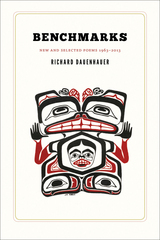

—C.D. Wright
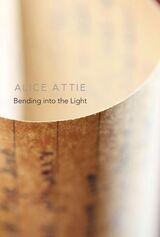
The poems in Alice Attie’s new volume, Bending into the Light, are poised on an ever-shifting threshold where words “up and down, side to side” appear as “figures in the distance approaching, each a declaration, each persisting”. Beings, things, ideas, present or vanishing, flow through the vessel of language wherein each exudes “its own aura, its own being, its own disappearance.” Attie’s voice is intricate and intimate, shaping and reshaping the space of being and the space of non-being. These contemplative poems, interspersed with a few haunting photographs and artworks, extol, and mourn, melding the quotidian with the philosophical where we are formed and transformed in the profound knowledge that “the voice has no center.”
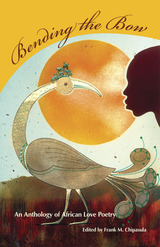
From the ancient Egyptian inventors of the love lyric to contemporary poets, Bending the Bow: An Anthology of African Love Poetry gathers together both written and sung love poetry from Africa.
This anthology is a work of literary archaeology that lays bare a genre of African poetry that has been overshadowed by political poetry. Frank Chipasula has assembled a historically and geographically comprehensive wealth of African love poetry that spans more than three thousand years. By collecting a continent’s celebrations and explorations of the nature of love, he expands African literature into the sublime territory of the heart.
Bending the Bow traces the development of African love poetry from antiquity to modernity while establishing a cross-millennial dialogue. The anonymously written love poems fromPharaonic Egypt that open the anthology both predate Biblical love poetry and reveal the longevity of written love poetry in Africa. The middle section is devoted to sung love poetry from all regions of the continent. These great works serve as the foundation for modern poetry and testify to love poetry’s omnipresence in Africa. The final section, showcasing forty-eight modern African poets, celebrates the genre’s continuing vitality. Among those represented are Muyaka bin Hajji and Shaaban Robert,two major Swahili poets; Gabriel Okara, the innovative though underrated Nigerian poet; Léopold Sédar Senghor, the first president of Senegal and a founder of the Negritude Movement in francophone African literature; Rashidah Ismaili from Benin; Flavien Ranaivo from Madagascar; and Gabeba Baderoon from South Africa.
Ranging from the subtly suggestive to the openly erotic, this collection highlights love’s endurance in a world too often riven by contention. Bending the Bow bears testimony to poetry’s role as conciliator while opening up a new area of study for scholars and students.
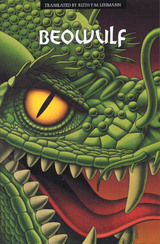
The name "Beowulf" lingers in our collective memory, although today fewer people have heard the tale of the Germanic hero's fight with Grendel, the dreadful Monster of the Mere, as recounted in this Anglo-Saxon epic.
This edition of Beowulf makes the poem more accessible than ever before. Ruth Lehmann's imitative translation is the only one available that preserves both the story line of the poem and the alliterative versification of the Anglo-Saxon original. The characteristic features of Anglo-Saxon poetry— alliterative verse with first-syllable stress, flexible word order, and inflectional endings—have largely disappeared in Modern English, creating special problems for the translator. Indeed, many other translations of Beowulf currently available are either in prose or in some modern poetic form. Dr. Lehmann's translation alone conveys the "feel" of the original, its rhythm and sound, the powerful directness of the Germanic vocabulary.
In her introduction, Dr. Lehmann gives a succinct summary of the poem's plot, touching on the important themes of obligation and loyalty, of family feuds, unforgivable crimes, the necessity of revenge, and the internal and external struggles of the Scandinavian tribes. She also describes the translation process in some detail, stating the guiding principles she used and the inevitable compromises that were sometimes necessary.
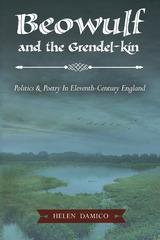
In Beowulf and the Grendel-kin: Politics and Poetry in Eleventh-Century England, Helen Damico presents the first concentrated discussion of the initiatory two-thirds of Beowulf’s 3,182 lines in the context of the sociopolitically turbulent years that composed the first half of the eleventh century in Anglo-Danish England.
Damico offers incisive arguments that major historical events and personages pertaining to the reign of Cnut and those of his sons recorded in the Anglo-Saxon Chronicle, the Encomium Emmae Reginae, and major continental and Scandinavian historical texts, hold striking parallels with events and personages found in at least eight vexing narrative units, as recorded by Scribe A in BL, Cotton Vitellius A.xv, that make up the poem’s quasi sixth-century narrative concerning the fall of the legendary Scyldings.
Given the poet’s compositional skill—widely relational and eclectic at its core—and his affinity with the practicing skalds, these strings of parallelisms could scarcely have been coincidental. Rather, Damico argues that examined within the context of other eleventh-century texts that either bemoaned or darkly satirized or obversely celebrated the rise of the Anglo-Danish realm, the Beowulfian units may bring forth a deeper understanding of the complexity of the poet’s compositional process.
Damico illustrates the poet’s use of the tools of his trade—compression, substitution, skillful encoding of character—to reinterpret and transform grave sociopolitical “facts” of history, to produce what may be characterized as a type of historical allegory, whereby two parallel narratives, one literal and another veiled are simultaneously operative.
Beowulf and the Grendel-Kin lays out the story of Beowulf, not as a monster narrative nor a folklorish nor solely a legendary tale, but rather as a poem of its time, a historical allegory coping with and reconfiguring sociopolitical events of the first half of eleventh-century Anglo-Saxon England.
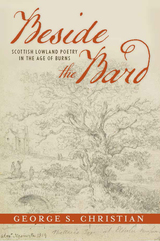
Published by Bucknell University Press. Distributed worldwide by Rutgers University Press.
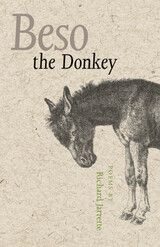
Beso the Donkey is a poetry cycle about a wounded, neglected, and abandoned jackass. In sparklingly clear and luminous poems, Richard Jarrette tells the story of Beso and of his caregiver's attempts to understand and heal him—an endeavor that teaches the man much about the meaning of life, death, peace, and acceptance. With undertones of Buddhist, Christian, Taoist, and Islamic faiths, Beso the Donkey incorporates elements of philosophy, ethics, religion, and morality.
As the book progresses, we sense the poet’s growing acceptance of life’s passing. Along with the author, we feel a deeper peace blossoming as Beso’s life is ending (which is itself a beginning). This is a lyrical story of loss and acceptance.
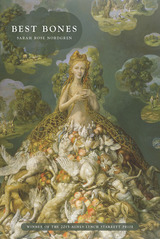
Best Bones is a house. When you walk around the rooms of the house, you overhear the desires and griefs of a family, as well as the unresolved concerns of lingering ghosts. The various voices in the house struggle against the family roles and social identities that they must wear like heavy garments—mother, father, wife, husband, sister, brother, servant, and master. All these voices crave unification; they want to join themselves into one whole sentient being, into “a mansion steering itself.”
The poems in Best Bones also explore the experience of living in a physical body, and how the natural world intersects with manmade landscapes and technologies. In it, mother has a reset button, servants blend into the furniture, and a doctor patiently oversees the pregnancy of the earth.
In these poems, the body is a working machine, a repository of childhood myth and archetype, and a window to the spiritual world. The poems strive to be visceral on the level of dream, or of a story that is half remembered and half fabricated.

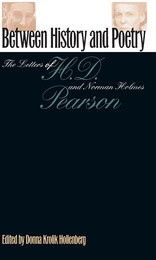
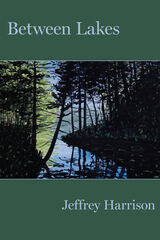
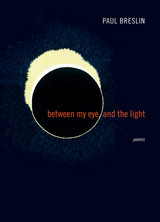
“Hole torn in the language, / How shall we speak?” The first lines of the first poem in Paul Breslin’s artful second collection of poetry demand an answer, of both poet and reader, to the seemingly unspeakable tragedies of modern life. Between My Eye and the Light forms a beautifully insistent exercise in the power of language to engage experiences both mundane and profound. Breslin queries far-flung corners of experience for answers, engaging childhood, his longtime home of Chicago, small moments of life, and encounters with artists such Rainer Maria Rilke and Derek Walcott. The poems even query the volume’s opening question, How shall we speak? While pat answers elude us, poetry acts as a bulwark against cliché and cynicism, strengthening those who have the courage to question and explore.
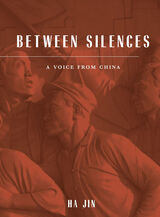
"In these poems Ha Jin gives voice to the millions whose lives were altered and whose tongues were silenced by the Cultural Revolution. . . .If Ha Jin speaks in tongues in these poems, we feel him behind those voices—the hidden director behind the scenes—never as a presence filled with stridency and self-congratulation; he brings a great empathy and compassion to his depiction of the fallible men and women whose acts and attitudes together make up history."—Roger Gilbert, Hungry Mind Review
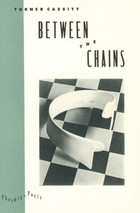
"Turner Cassity's excellent work is like no one else's. It is funny, at times perverse, and wickedly serious. In this present collection, such poems as 'When in Doubt, Remain in Doubt,' 'Acid Rain on Sherwood Forest,' and 'How Jazz Came up the Elbe' show one of our finest poets at the top of his game."—Timothy Steele
"Cassity thinks on his feet, agile and fierce—funny too."—Thom Gunn
"At a time when most poems seem a commodity, quickly written, quickly read and easily thrown away, Turner Cassity's poems seem even more astonishing examples of good writing and reading, exceptions to be admired and kept."—Edgar Bowers
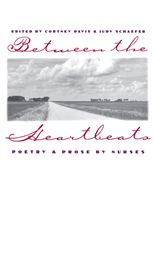
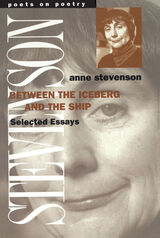
Feminist critics will find much to invigorate and infuriate them in these essays. Stevenson believes that the "takeover" of poetry by critical theorists has, in recent years, all but brought about its demise in England and America. But she also fears that the media's doctrine of mass marketability may have a detrimental effect on the future of poetry. Her essays on Plath, Bishop, Irish poetry, and other subjects are as witty as they are challenging, upsetting many of the easy assumptions of our putatively "postmodern" era.
Anne Stevenson is the author of numerous books, including Bitter Fame: A Life of Sylvia Plath, The Other House, Four and a Half Dancing Men, and most recently, Collected Poems 1955- 1995.
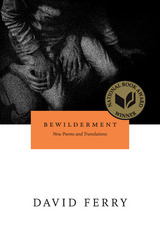
Winner of the 2012 National Book Award for Poetry.
To read David Ferry’s Bewilderment is to be reminded that poetry of the highest order can be made by the subtlest of means. The passionate nature and originality of Ferry’s prosodic daring works astonishing transformations that take your breath away. In poem after poem, his diction modulates beautifully between plainspoken high eloquence and colloquial vigor, making his distinctive speech one of the most interesting and ravishing achievements of the past half century. Ferry has fully realized both the potential for vocal expressiveness in his phrasing and the way his phrasing plays against—and with—his genius for metrical variation. His vocal phrasing thus becomes an amazingly flexible instrument of psychological and spiritual inquiry. Most poets write inside a very narrow range of experience and feeling, whether in free or metered verse. But Ferry’s use of meter tends to enhance the colloquial nature of his writing, while giving him access to an immense variety of feeling. Sometimes that feeling is so powerful it’s like witnessing a volcanologist taking measurements in the midst of an eruption.
From Bewilderment:
October
The day was hot, and entirely breathless, so
The remarkably quiet remarkably steady leaf fall
Seemed as if it had no cause at all.
The ticking sound of falling leaves was like
The ticking sound of gentle rainfall as
They gently fell on leaves already fallen,
Or as, when as they passed them in their falling,
Now and again it happened that one of them touched
One or another leaf as yet not falling,
Still clinging to the idea of being summer:
As if the leaves that were falling, but not the day,
Had read, and understood, the calendar.
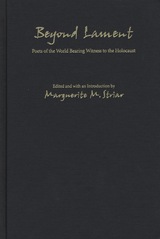
Editor Marguerite M. Striar has arranged the nearly 300 poems in this volume to tell the story beginmning with the early premonitions of Nazi evil in 1933, through the course of the unthinkable violence that ended in 1945 with Hitler's demise, to the flourishing of concern for human rights in the aftermath of the Holocaust. These works by well-known poets such as Paul Celan, Nelly Sachs, Czeslaw Milosz, Dannie Abse, and Robert Pinsky, as well as many lesser-known or unknown poets, show how poetry makes history memorable, confirm the resiliance of the human spirit, and prove that even in the fact of great suffering, the flame of creation will not be extinguished.
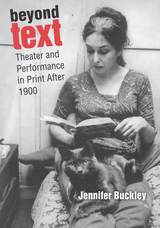
Taking up the work of prominent theater and performance artists, Beyond Text reveals the audacity and beauty of avant-garde performance in print. With extended analyses of the works of Edward Gordon Craig, German expressionist Lothar Schreyer, the Living Theatre, Carolee Schneemann, and Guillermo Gómez-Peña, the book shows how live performance and print aesthetically revived one another during a period in which both were supposed to be in a state of terminal cultural decline. While the European and American avant-gardes did indeed dismiss the dramatic author, they also adopted print as a theatrical medium, altering the status, form, and function of text and image in ways that continue to impact both the performing arts and the book arts.
Beyond Text participates in the ongoing critical effort to unsettle conventional historical and theoretical accounts of text-performance relations, which have too often been figured in binary, chronological (“from page to stage”), or hierarchical terms. Across five case studies spanning twelve decades, Beyond Text demonstrates that print—as noun and verb—has been integral to the practices of modern and contemporary theater and performance artists.
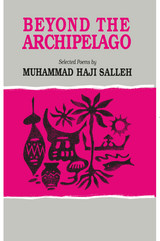
A collections of 70 poems from one of Malaya’s leading poets, that depict longing, loneliness, modernization, and insights in Malaysian culture.
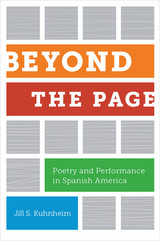
Jill S. Kuhnheim, looking at poetry and performance in Spanish America over time, has organized the book to begin with the early twentieth century and arrive at the present day. She includes noteworthy poets and artists such as José Martí, Luis Palés Matos, Eusebia Cosme, Nicomedes Santa Cruz, Pablo Neruda, César Vallejo, and Nicolás Guillén, as well as very recent artists whose performance work is not as well known. Offering fresh historical material and analysis, the author illuminates the relationship between popular and elite cultural activity in Spanish America and reshapes our awareness of the cultural work poetry has done in the past and may do in the future, particularly given the wide array of technological possibilities. The author takes a broad view of American cultural production and creates a dialogue with events and criticism from the United States as well as from Spanish American traditions.
Oral and written elements in poetry are complementary, says Kuhnheim, not in opposition, and they may reach different audiences. As poetry enjoys a revival with modern media, performance is part of the new platform it spans, widening the kind of audience and expanding potential meanings.
Beyond the Page will appeal to readers with an interest in poetry and performance, and in how poetry circulates beyond the page. With an international perspective and dynamic synthesis, the book offers an innovative methodology and theoretical model for humanists beyond the immediate field, reaching out to readers interested in the intersection between poetry and identity or the juncture of popular-elite and oral-written cultures.

“I thought I forgave you,” Eugenia Leigh tells the specter of her father in Bianca. “Then I took root and became / someone’s mother.” Leigh’s gripping second collection introduces us to a woman managing marriage, motherhood, and mental illness as her childhood abuse resurfaces in the light of “this honeyed life.” Leigh strives to reconcile the disconnect between her past and her present as she confronts the inherited violence mired in the body’s history. As she “choose[s] to be tender to [her] child—a choice / [her] mangled brain makes each day,” memories arise, asking the mother in her to tend, also, to the girl she once was. Thus, we meet her manic alter ego, whose history becomes the gospel of Bianca: “We all called her Bianca. My fever, my havoc, my tilt.” These poems recover and reconsider Leigh’s girlhood and young adulthood with the added context of PTSD and Bipolar Disorder. They document the labyrinth of a woman breaking free from the cycle of abuse, moving from anger to grief, from self-doubt to self-acceptance. Bianca is ultimately the testimony of one woman’s daily recommitment to this life. To living. “I expected to die much younger than I am now,” Leigh writes, in awe of the strangeness of now, of “every quiet and colossal joy.”

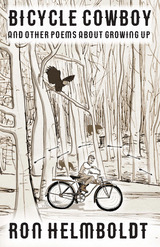
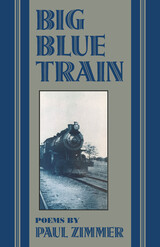

The Big Question leads off with a major essay explaining and exploring the concept of postmodernism. The next sections include pieces about poetry and fiction, lives and letters, and criticism and controversy.
Other "big questions" addressed include political correctness, the genre of literary biography, academic life and deconstruction. There is a humorous piece on poetry "slams" and the whole "downtown" poetry scene, a feisty op-ed column (on the deconstruction of the Gettysburg Address), a pair of wickedly satirical poems, as well as a group of exceptional book reviews.
The subjects covered range from Philip Larkin to Philip Roth- from the greatest poetry hoax of the twentieth century (which took place in Australia during World War II) to Charles Dickens's unfinished last novel- and from nineteenthth-century American poetry to the political career of Martin Heidegger.
David Lehman is a poet and author of Signs of the Times: Deconstruction and the Fall of Paul de Man. He is series editor of the celebrated Best American Poetry anthology.
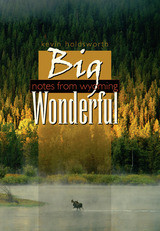
Growing up in Utah, Holdsworth couldn't wait to move away. Once ensconced on the East Coast, however, he found himself writing westerns and dreaming of the mountains he'd skied and climbed. Fed up with city life, he moved to a small Wyoming town.
In Big Wonderful, he writes of a mountaineering companion's death, the difficult birth of his son, and his father's terminal illness - encounters with mortality that sharpened his ideas about risk, care, and commitment. He puts a new spin on mountaineering literature, telling wild tales from his reunion with the mountains but also relating the surprising willpower it took to turn back from risks he would have taken before he became a father. He found he needed courage to protect and engage deeply with his family, his community, and the wild places he loves.
Holdsworth's essays and poems are rich with anecdotes, characters, and vivid images. Readers will feel as if they themselves watched a bear destroy an entire expedition's food, walked with his great-great-grandmother along the icy Mormon Trail, and tried to plant a garden in Wyoming's infamous wind.
Readers who love the outdoors will enjoy this funny and touching take on settling down and adventuring in the West's most isolated country.
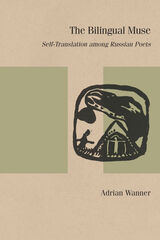
The Bilingual Muse analyzes the work of seven Russian poets who translated their own poems into English, French, German, or Italian. Investigating the parallel versions of self-translated poetic texts by Vladimir Nabokov, Joseph Brodsky, Andrey Gritsman, Katia Kapovich, Marina Tsvetaeva, Wassily Kandinsky, and Elizaveta Kul’man, Adrian Wanner considers how verbal creativity functions in different languages, the conundrum of translation, and the vagaries of bilingual identities.
Wanner argues that the perceived marginality of self-translation stems from a romantic privileging of the mother tongue and the original text. The unprecedented recent dispersion of Russian speakers over three continents has led to the emergence of a new generation of diasporic Russians who provide a more receptive milieu for multilingual creativity.
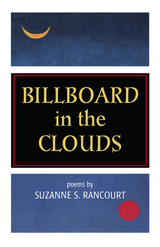
In this remarkable debut book of poems, winner of the Native Writers First Book Award, Suzanne S. Rancourt, presents her experience as a mixed-raced person seeking understanding through relationship with the natural world and dominant culture. Her family portraits are reminiscent of E. A. Robinson; her sensuous nature poems are imbued with love of earth as a "blessing."
Dance
my legs are explosions
expressions
of lustful wind
i converse through cracks in the walls
slipping in my true intention like a snow drift
on the inside
side of a door i pound
your chest
has become my wailing wall
i crave your tongue dusted
with words and implications
i have something you need
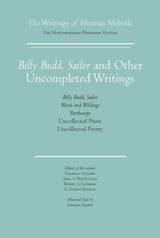
These unfinished writings include, besides Billy Budd, two projected volumes containing poems and prose pieces, Weeds and Wildings and Parthenope; three prose pieces, “Rammon,” “Story of Daniel Orme,” and “Under the Rose”; and some three dozen poems of varying lengths. Some of these pieces were surely composed late in Melville’s career, during his retirement, but others may date to as early as the 1850s. Except for Billy Budd, many of these works have not been readily available in reliable texts, when available at all.
This volume, the result of the editors’ meticulous study of the manuscripts, offers new reading texts, with significant corrections of words, phrases, and titles, the inclusion of heretofore unpublished lines of verse, and the return to their original locations of the two poems, “The Enviable Isles” and “Pausilippo,” that Melville had extracted for use in John Marr (1888) and Timoleon (1891). Hershel Parker’s Historical Note traces how these writings fit into the trajectory of Melville’s career, and the rest of the Editorial Appendix presents the scholarly evidence and decisions made in creating the reading texts. As a whole, the Northwestern-Newberry Edition of The Writings of Herman Melville, now complete in fifteen volumes, offers for the first time the total body of Melville’s extant writings in a critical text, faithful to his intentions.
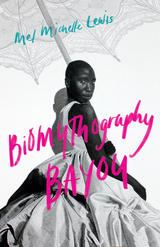
Biomythography Bayou is more than just a book of memoir; it is a ritual for conjuring queer embodied knowledges and decolonial perspectives. Blending a rich gumbo of genres—from ingredients such as praise songs, folk tales, recipes, incantations, and invocations—it also includes a multimedia component, with “bayou tableau” images and audio recording links. Inspired by such writers as Audre Lorde, Zora Neale Hurston, and Octavia Butler, Mel Michelle Lewis draws from the well of her ancestors in order to chart a course toward healing Afrofutures. Showcasing the nature, folklore, dialect, foodways, music and art of the Gulf’s coastal communities, Lewis finds poetic ways to celebrate their power and wisdom.
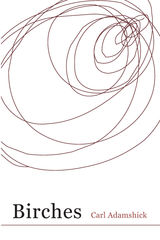
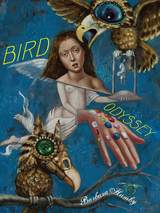
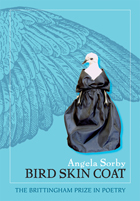

The master of Old Comedy.
Aristophanes of Athens, one of the world’s greatest comic dramatists, has been admired since antiquity for his iridescent wit and beguiling fantasy, exuberant language, and brilliant satire of the social, intellectual, and political life of Athens at its height. The Loeb Classical Library edition of his plays is in four volumes.
The Introduction to the edition is in Volume I. Also in the first volume is Acharnians, in which a small landowner, tired of the Peloponnesian War, magically arranges a personal peace treaty; and Knights, perhaps the most biting satire of a political figure (Cleon) ever written.
Three plays are in Volume II. Socrates’ “Thinkery” is at the center of Clouds, which spoofs untraditional techniques for educating young men. Wasps satirizes Athenian enthusiasm for jury service. In Peace, a rollicking attack on war-makers, the hero travels to heaven on a dung beetle to discuss the issues with Zeus.
The enterprising protagonists of Birds create a utopian counter-Athens ruled by birds. Also in Volume III is Lysistrata, in which our first comic heroine organizes a conjugal strike of young wives until their husbands end the war between Athens and Sparta. Women again take center stage in Women at the Thesmophoria, this time to punish Euripides for portraying them as wicked.
Frogs, in Volume IV, features a contest between the traditional Aeschylus and the modern Euripides, yielding both sparkling comedy and insight on ancient literary taste. In Assemblywomen Athenian women plot to save Athens from male misgovernance—with raucously comical results. Here too is Wealth, whose gentle humor and straightforward morality made it the most popular of Aristophanes’ plays from classical times to the Renaissance.
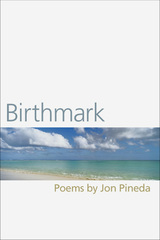
In Jon Pineda’s debut collection Birthmark, loss takes the shape of a scar, memory the shape of a childhood, and identity the shape of a birthmark on a lover’s thigh. Like water taking the form of its container, Pineda’s poems swell to fill the lines of his experiences. Against the backdrop of Tidewater, Virginia’s crabs and cicadas, Pineda invokes his mestizo—the Tagalog word for being half Filipino—childhood, weaving laments for a tenuous paternal relationship and the loss of a sibling. Channeling these fragmented memories into a new discovery of self, Birthmark reclaims an identity, delicate yet unrelenting, with plaintive tones marked equally by pain, reflection, and redemption.
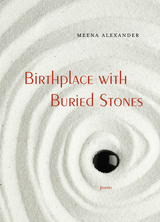
With their intense lyricism, Meena Alexander’s poems convey the fragmented experience of the traveler, for whom home is both nowhere and everywhere. The landscapes she evokes, whether reading Bashō in the Himalayas, or walking a city street, hold echoes of otherness. Place becomes a palimpsest, composed of layer upon layer of memory, dream, and desire. There are poems of love and poems of war—we see the rippling effects of violence and dislocation, of love and its aftermath. The poems in Birthplace with Buried Stones range widely over time and place, from Alexander’s native India to New York City. We see traces of mythology, ritual, and other languages. Uniquely attuned to life in a globalized world, Alexander’s poetry is an apt guide, bringing us face to face with the power of a single moment and its capacity to evoke the unseen and unheard.

Through finely crafted poems that utilize a plainspoken roughness to keep the reader slightly disoriented, Almallah replicates his own verbal and cultural experience of existing between languages and societies. There is a sense of displacement to these poems as Almallah recounts the amusing, sad, and perilous moments of day-to-day living in exile. At the heart of Bitter English is a sense of loss, both of home and of his mother, whose struggle with Alzheimer’s becomes a reflection of his own reality in exile. Filled with wit, humor, and sharp observations of the world, Bitter English brings a fresh poetic voice to the American immigrant experience.
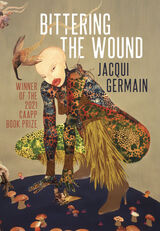
Jacqui Germain’s debut collection, Bittering the Wound, is a first-person retelling of the 2014 Ferguson uprising. Part documentation, part conjuring, this collection works to share the narrative of the event with more complexity, audacity, care, and specificity than public media accounts typically allow. Throughout the book, Germain also grapples with navigating the impacts of sustained protest-related trauma on mental health as it relates to activism and organizing. The book also takes occasional aim at the media that sensationalized these scenes into a spectacle and at the faceless public that witnessed them.
Bittering the Wound challenges the way we discuss, write about, and document political unrest. It offers fresh language and perspective on a historic period that reverberated around the world. Germain takes the reader through poems that depict a range of scenes—from mid-protest to post-protest—and personifies St. Louis with a keen and loving eye.
Bittering the Wound was selected by Douglas Kearney as the winner of the 2021 CAAP Book Prize.
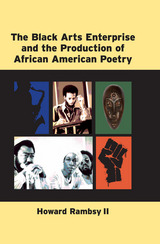
Focusing on the material production of Black Arts poetry, the book combines genetic criticism with cultural history to shed new light on the period, its publishing culture, and the writing and editing practices of its participants. Howard Rambsy II demonstrates how significant circulation and format of black poetic texts—not simply their content—were to the formation of an artistic movement. The book goes on to examine other significant influences on the formation of Black Arts discourse, including such factors as an emerging nationalist ideology and figures such as John Coltrane and Malcolm X.
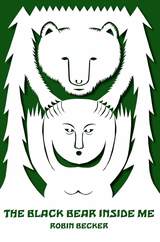

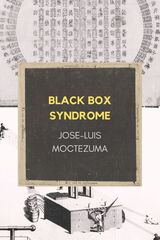
Jose-Luis Moctezuma’s Black Box Syndrome is a series of poems—or “black boxes”—based on black hexagrams in the I Ching, an ancient Chinese divination text. Following the aleatoric tradition popularized by the surrealists and extended by the work of John Cage and Jackson Maclow, these poems cast their lenses on the hazards of the incessant financialization of everyday life. Synthesizing chance-operational aesthetics with Aztec anatomical science, conspiracy theory with systems theory, and the black box model with the concept of the “influencing machine,” Black Box Syndrome explores tensions between lyric excess and digital compaction in the age of pandemic. Over and against the corrosive world-shrinking effects of Wall Street risk management and futures trading, the black boxes in this book propose a counter-divination that distorts, deranges, and decolonizes the logic of empire.

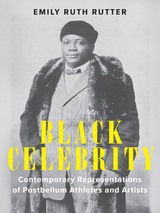
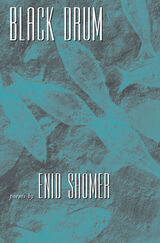
In Black Drum, Enid Shomer fuses mind with body, knowledge with physical being, and affirms the capacity of language to accomplish this fusion. With clearly fashioned images, her focus often narrows on close particulars or leaps to wide angles, as in these lines from the title poem in which the narrator is battling a fish:
We had been struggling for ten
minutes—a lifetime—over whose world
would prevail: his, with its purled
edges and continuous center, or mine
with its yin and yang,
its surface incised into sky
and sea, the land like a scar
between.
The characters in Shomer’s poems discover the ceaseless motion of living in the body and the inevitability of decay. In “Notes from the Sketch book of Gustav Klimt,” Shomer boldly says, “I have always balked / at the purely decorative, / but then I saw that the symbolic / could stir us by its absence.”
Black Drum insists that life on earth speaks of transformation and transience; epiphany can happen any where, with “schemes illegal and grand” with slot machines, race horses, dead or estranged relatives, and lost love. Enid Shomer signals us to make the most of life, despite our limitations and in the face of bewildering catastrophe.
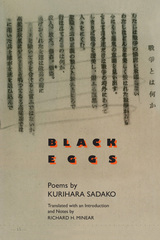

John Edgar Tidwell’s introduction examines both Davis’s poetry and his politics, presenting a subtle portrait of a complex writer devoted to exposing discriminatory practices and reaffirming the humanity of the common people.
READERS
Browse our collection.
PUBLISHERS
See BiblioVault's publisher services.
STUDENT SERVICES
Files for college accessibility offices.
UChicago Accessibility Resources
home | accessibility | search | about | contact us
BiblioVault ® 2001 - 2024
The University of Chicago Press









